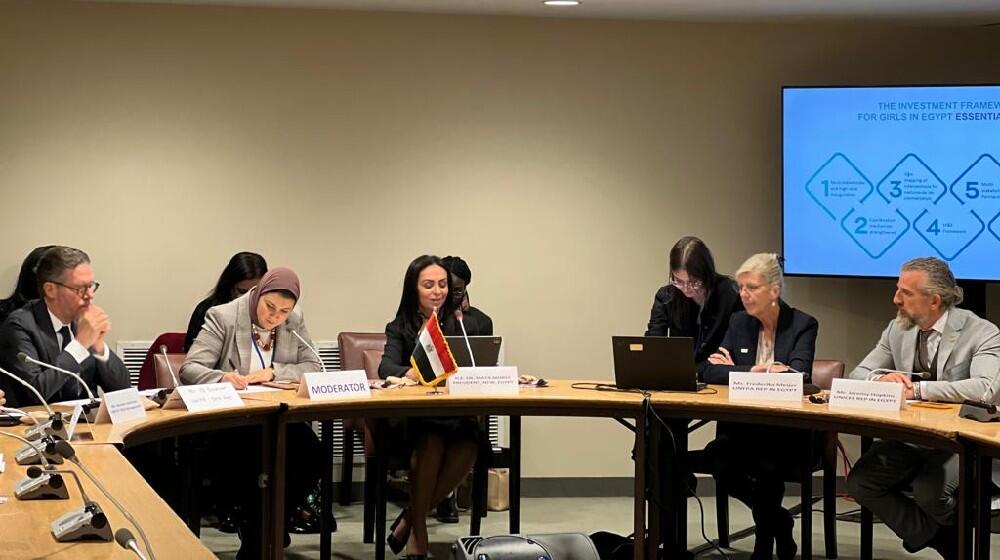New York, 6 March 2023- The Government of Egypt, represented by the National Council for Women presented the Investment Framework for Girls in Egypt at a side event during the 67th Session of the Commission on the Status of Women (CSW); in cooperation with the United Nations Population Fund (UNFPA) and the United Nations Children’s Fund (UNICEF).
The session showcased “Noura” and “Dawwie”, two programs driving the collective mobilization for girls’ empowerment in Egypt. Both programs gained the patronage of the First Lady of Egypt, Ms. Entissar El-Sisi, and were integrated in the flagship National Project for Development of the Egyptian Family.
The event brought together Dr. Maya Morsy, President of the National Council for Women, Ms. Hannan Suleiman, UNICEF Deputy Executive Director, Mr. Ib Peterson, UNFPA Deputy Executive Director, Ms. Frederika Meijer, UNFPA Representative in Egypt, Mr. Jeremy Hopkins, UNICEF Representative in Egypt and Ms. Cybill Sigler, Acting Deputy Assistant Administrator for the Middle East Bureau, USAID.
Today, Egypt is home to almost 20 million girls below the age of 19 years old. The National Investment Framework for girls coordinates and facilitates work towards girl’s empowerment. It has at its core the two programmes “Dawwie” and “Noura”.
“Dawwie”, launched in 2019, is a multi-stakeholder initiative to promote social support for girls’ empowerment and to advocate for coordinated efforts to enhance access to quality services, skills development, and opportunities to participate and be heard.
Led by the National Council for Women (NCW), and the National Council for Childhood and Motherhood (NCCM), “Dawwie” is supported by other stakeholders including Ministries of Education and Technical Education, Social Solidarity, Health and Population, Youth and Sports, Culture, and Information and Communication Technology. It is also supported by the National Council for Persons with Disability (NCPD) and the National Population Council (NPC), in addition to civil society organizations and international organizations.
Currently the “Dawwie” empowerment journey entails storytelling circles, intergenerational dialogue, community dialogue, digital learning, sport and referral mechanism to skills building, protection, health and nutrition services.
The “Noura” Framework was launched under the leadership of the National Council for Women, in partnership with UNFPA in 2021 as a girls’ empowerment initiative, adapting a global best practice named the Girls Assets Building Framework to Egyptian context.
The Girls Assets Building Framework: Noura, is a tailored 40 week program where girls, through a guided curriculum, are trained to build their social, health and economic assets.
The program empowers adolescent girls by providing them with health, social, economic, and digital assets to make their own choices. It also works to create positive social and gender norms towards adolescent girls within their households and communities and strengthens systems to ensure quality and accessible services responsive to adolescent girls.
“Egypt perceives investing in children and girls as one of the important pillars in achieving the vision and goals of sustainable development agenda,” said Maya Morsy, President of the National Council for Women. “The Government of Egypt sets girls' empowerment more evidently as a solid priority through adopting and implementing “The National Investment Framework for Girls in Egypt” in order to create an impact of unleashing the untapped potential of girls aged 10-24 to boost Egypt's human capital, through implementing both “Dawwie” and “Noura” Programmes: Combined through “Dawwie ya Noura”, she added.
“We are building partnerships across the national and international communities to further promote girls’ empowerment and activate their role in building a prosperous country,” she concluded.
H.E Ambassador Osama Abdel Khaleq, Permanent Representative to the United Nations in New York commented, “I am pleased by the renewed support of our partners in development to our ongoing efforts to ensure that full empowerment of women and girls in Egypt, in line with our socio-economic developmental projects under Egypt’s vision 2030”.
For his part, Mr. Ib Peterson, UNFPA Deputy Executive Director, Management, said, “A girl with the power to exercise her rights, the knowledge to make choices and the skills to lead a healthy and productive life paves the way for the achievement of the 2030 agenda.”
From her end, Ms. Hannan Sulieman, Deputy Executive Director, Management, UNICEF said: “According to the World Bank, if young women were as economically active as young men, annual GDPs could grow up to 4.4 percent faster. In other words: we need the economic firepower of a generation of young women who are healthy, educated and protected. They’re calling out for a fighting chance. An education. Protection from violence and discrimination. Meaningful digital access and connectivity. Technology and science-based skills. Apprenticeships, job-shadowing opportunities and internships. Mentorships and peer learning opportunities.”
Ms. Frederika Meijer, UNFPA Representative in Egypt asserted that “The empowerment of girls cannot happen in a vacuum … we need to work with the girl, and also create a strong, solid enabling environment for her to grow, strive and fulfill her potential.. that is why “Noura” and “Dawwie” are essential pieces of the puzzle.”
Towards that end, Mr. Jeremy Hopkins, UNICEF Representative in Egypt said: “I am thrilled to see the Government of Egypt bringing such necessary and significant focus to the Investment Framework for Girls in Egypt. The partnership that we discussed today, spearheaded by the National Council for Women and the National Council for Childhood and Motherhood, UNICEF and UNFPA will be instrumental in accelerating this transformative agenda. I also want to thank USAID, Spain, and the Netherlands representative for their generous support.”
Ms. Cybill Sigler, Acting Deputy Assistant Administrator for the Middle East Bureau, USAID highlighted “At USAID, we recognize that sustainable development is only possible by embracing the contributions of all members of society. Together with the Government of Egypt, UNICEF, and our partners, the United States shares a strong commitment to empowering women and girls and achieving gender equality in Egypt."


